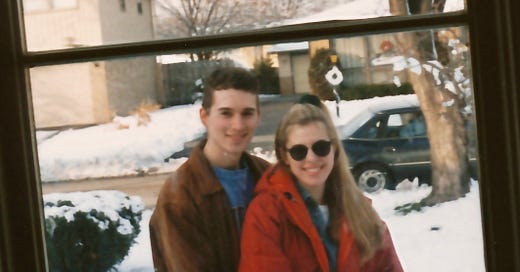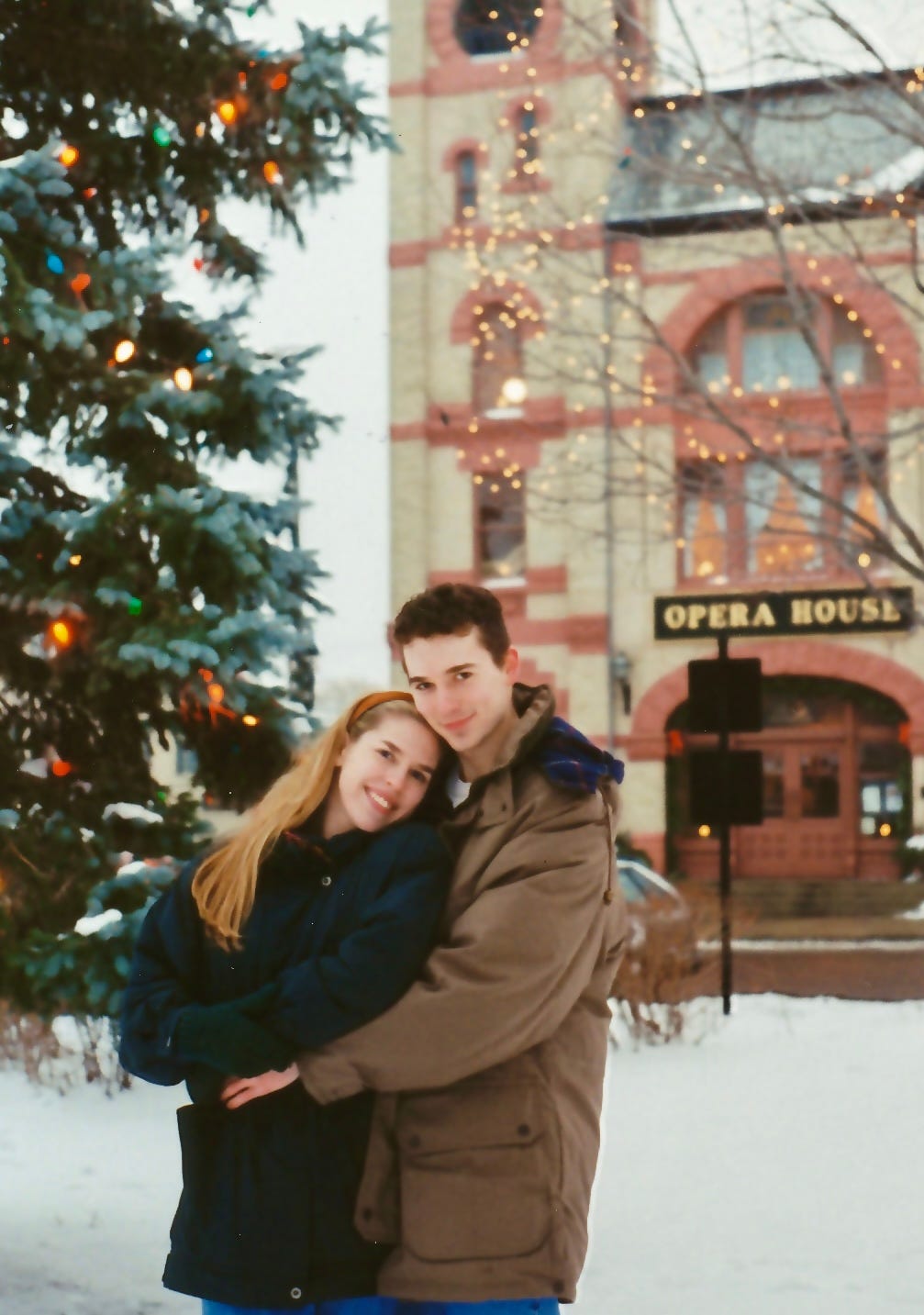Rediscovering '90s Vibes: Why Adulting Feels Like Déjà Vu 30 years later
Figuring out what to do and discovering what to treasure
Thirty years ago, Brian and I celebrated our first Christmas as newlyweds. He was studying filmmaking at Columbia in Chicago and working in a Circuit City warehouse. I worked as a nurse assistant and was getting ready to start nursing school.
Brian was learning that few people who go to film school actually make films but instead take any job to pay off hefty art school loans. Nursing was my safe second choice after journalism, but I was already starting to second guess it after working as an assistant.
Near the holidays, I picked up extra hours selling pressure-activated corduroy massage pillows at a mall cart. It was a clock-watching job with no boss watching me. So mostly, I sat and thought and wrote, trying to figure out some way of piecing together a path to somewhere we’d want to be, or at least be okay with.
“Your options are limitless.” I hated hearing that as a young adult. That’s so not true. Options cost money, rarely pop up from nowhere, and come with prerequisites that have prerequisites of their own. Choosing among options isn’t easy either. Each option has trade-offs, but there’s no way of fully knowing what you'll be trading at the time you’re choosing.
Personalized practical advice and guidance would've been far more helpful. Even today, that’s the hardest kind of information to find. The democratization of information did not democratize that. “What do I wanna do?” often becomes “What can I tolerate?”
The first season of Friends aired in 1994, capturing early adulthood disillusionment in an addictively fun way. No one really wants to watch what real life is really like. Our VCR was set to record, but Mad About You was our true fave in the must-see lineup. Besides the show being about a newly married couple like we were, the inward neuroticisms and personalities of the Jamie and Paul characters also felt more relatable—minus their monied lifestyle of course.
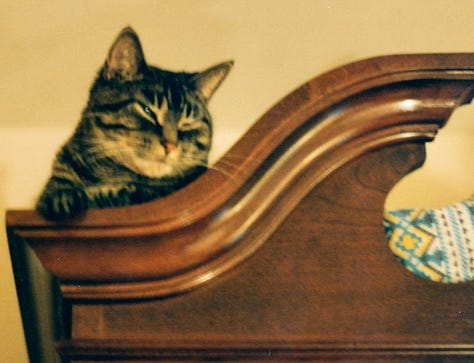



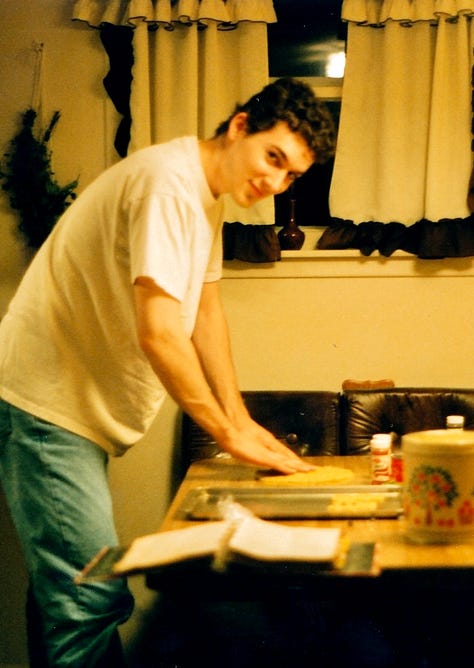

All I want for Christmas
That Christmas, and for many that followed, our checking account was often within double-digit rounding to zero. We cut each other’s hair, never ate out, and tried to get by without buying anything, including overpriced textbooks in college. Our copy of the Tightwad Gazette, however, was truly required reading. Learning how to get by on less was lesson number one. And most of the time, less felt more than enough.
“All I want for Christmas is you” was in its first season of replay. The song’s staying power extends beyond Mariah’s amazingly pitch-perfect voice. What can be better than the coziness of being with a loved one on Christmas?
That Christmas was one of our favorites. Brian gave me one of the sweetest Christmas presents I’ve ever gotten: a trio of ceramic Christmas village houses he painted for me. We made homemade bread. We went for walks. We babied our cat Mitzi. We watched old movies. And though life never felt limitless, something always felt possible. We’d do what we could and then plan for something better. The planning part was always more fun than the having. It took us time to learn that lesson.
Changing course
The following year, I switched majors to pharmacy. It seemed like an off-ramp to the doctor-nurse dynamic that still felt from the Mad Men era where I worked. The medical center’s wood-paneled walls and low ceilings felt every bit as mid-century (but not mod) as the shitty behavior towards nurses certain male doctors got away with.
Another pharmacy bonus was I’d get to take more chemistry classes. Studying how atoms bond and interact seemed so much simpler than trying to figure out people. I quit chemistry short of grad school, though. I think baby fever set in earlier than planned in part from seeing older Gen Xers face fertility challenges, including fictional ones like the Jamie and Paul characters on Mad About You.
Fertility messages about timing and age were so mixed and misunderstood—and are still even today.
Brian’s career options seemed trickier than mine. He’d taken every art class in community college. What he really loved doing was special effects, and he worked as a makeup artist in community theatre. It’s partly why he was studying film. What seemed like lottery-odds of getting a job doing it was also why he was reconsidering career paths.
Teaching was an obvious, more practical option—and a familiar one too. Brian’s dad was an awesome teacher. And Brian liked mentoring one on one. We met each other while working as activity aides. But interacting with so many people all at once, all day long felt like too much of a stretch for Brian’s socially awkward, introverted nature—not to mention the thought of having difficult conversations, the kind he knew teachers needed to sometimes have.
No, not just anyone can teach and manage a classroom full of kids. And yes, teachers and their complex skillsets are highly undervalued. The relative value placed on many skills make no sense.
Math is needed (for almost nothing)
While Brian was pondering what to do, my mom suggested computer science. That seemed like an odd fit. Brian was an art kid in school, rarely used computers, and struggled in math. But my mom knew a little secret: You don’t actually need to be good in math to do most IT jobs well (or almost any job if you think about it).
Working as a recruiter, my mom had a decade’s worth of conversations with people working in IT. From new grads to seasoned specialists, both in the States and abroad, she talked to so many people in the field and knew the gist of what skills were needed to do the types of jobs that were available. Brian was plenty “smart” enough, though he never imagined himself to be in that way.
It’s so odd how people get put in boxes based on one thing they’re good at (or not good at). Stranger still is how the comparison in one group setting and at one time of life can feel forever fixed. The difficulty of changing course and the high bar to enter a field doesn’t help.
Many fields, pharmacy included, have inflated prerequisites that have little to do with being successful in the profession but have a lot to do with limiting who gets a chance to enter them. Professions drawing from fewer backgrounds limit the professions and that limits what good they can offer society.
Brian went to community college for a fourth year and then transferred to a state school for computer science. One Gen X advantage of being born when birth rates plummeted meant less competition when getting into college.
Today, I don’t know that either of us could have gotten where we did from where we started at 18, especially without parents paying. College was much cheaper then. A computer, though, was not.
The day the new Gateway desktop arrived was such a big deal.
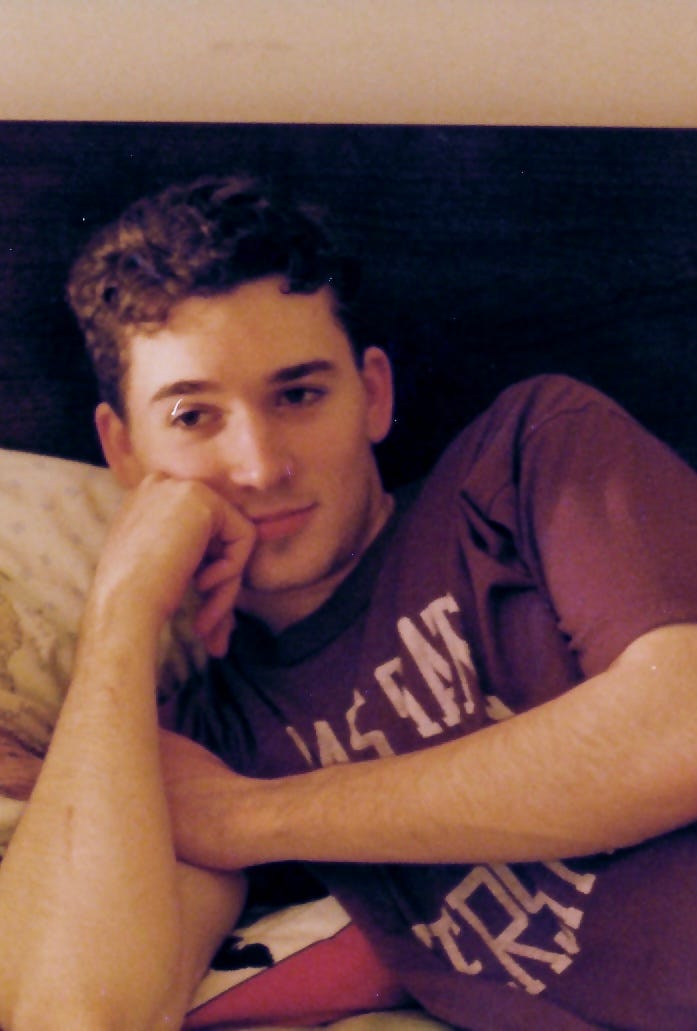

Race to the top craze
During our early years together, we always thought once we finished college and found jobs, we’d have this “made-it” feeling of security. We’d be able to give our kids a more secure start. We wouldn’t have to worry so much. They wouldn’t have to either.
But a secure feeling never came from a job or a zip code. Life felt stressful, and everyone seemed stressed simply trying to hold on and keep up. Looking back, I see the swirl we were in. I couldn’t see it then, but it feels worthwhile noting now.
As the Cold War ended, education became the new arms race of the 21st century. We were in a “race to the top,” so might as well name school reform legislation for what it was. (That phrase instills a sense of panic, doesn’t it?)
Academic competition grew alongside parental anxiety about their kid making the college cut. The worry filtered down to parents of young kids, even babies—at least in places where we lived, largely consisting of double college-educated parents in upper-income households.
The message was almost like your kids might end up starving if they didn’t become super STEM superstars. I remember reading Thomas L. Friedman’s The World Is Flat bestseller in 2006, the same year we stretched to move into the neighborhood with top-rated schools for our kindergartner and crawling tot. I regret buying into any of that. Being overly anxious about anything is bound to lead to mistakes.
“When I was growing up, my parents told me, ‘Finish your dinner. People in China and India are starving.’ I tell my daughters, ‘Finish your homework. People in India and China are starving for your job,’” Friedman wrote in The World Is Flat.
I feel silly now for not reading that book without a more critical eye. Was it good to force-feed boomers because people elsewhere were without food? (My dad had beets shoved up his nose as a kid to learn to never leave the dinner table with food left on his plate.) How did that help anyone? Why take a nonsensical and harmful way of thinking and impose it on a new generation in a new way?
Too much pressure was put on some kids. And despite “No Child Left Behind” promises, many more kids were left out. Meanwhile, prerequisites, credentialing, and hoops to jump through to enter almost any field grew more intimidating and no doubt discouraged many without extra resources or unique talents from trying or even imagining.
Grow the tree you’ve got
As parents, we gradually learned that just because you put your kid in a school with the top math scores in the state doesn’t mean your kid will have them too. A handful of years after reading Freidman’s book, I read Tom Sturges’ Grow the Tree You Got and found it far more helpful, just by the title alone. Raising the child you have as they change and grow is all you can do as a parent. And it’s also the BEST you can do as a parent.
“You can be anything” is fakery and even daunting. Some constraints of reality feel more comfortable and true. But no matter the age, a hopeful feeling of becoming makes getting up in the morning and slogging through more doable and even joyful, at least sometimes. Everything might not be possible, but lots of somethings are with help.
“I’d be great at so many things, but I just don’t have the skills to do any of them,” our slightly sarcastic 8th-grade son said last week. I remember feeling that way at 14. I still feel that way sometimes, don’t you? Everyone could become great at many things if given the support and chance.
Of course, no one can do everything, and choosing what to focus on is always hard. A taste of possibility, a person believing you can do it, a tiny triumph to build on—something is often needed to find a place to get started and then keep going. The higher the hurdles, the more help is needed.
Admitting how much help we need is a sign of strength. And it’s an opportunity to see places to be that person for someone else.


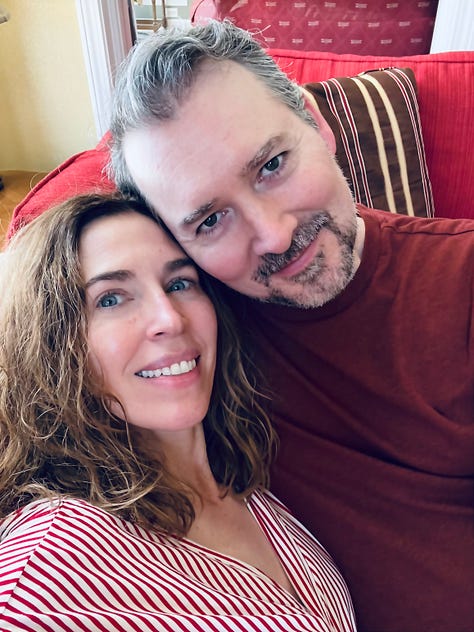
This month, I’ve been working on tolerating Wisconsin winter weather. Getting out for a walk on days when it’s above 20°F and not too icy is helping (to my surprise). My body’s not shivering so quickly. The cold is becoming more tolerable, though I still don’t love winter like Brian.
Weather is one thing. Some things I hope I never get used to. People are expected to accept far too many things that no one should ever have to tolerate.
Brian and I are both over 50. We’re more tired, sometimes achy, and limited by options of nature and those of our choosing. Still, we’re feeling more like our younger selves. Life is uncertain, daunting, and limited. Tiny treasures were all we could afford then. Tiny treasures are all we have the bandwidth for now. Most of the time, they still feel like more than enough.



Meet Nora-Kathleen
“I’m a girl who likes style,” our daughter Nora used to say when she was five. And she’s back in fashion! Nora recently started a position as a stylist assistant at Shopbop. It’s a growth opportunity that allows Nora to use her unique mix of talents and experience in clothing construction, communication, content creation, and fashion retail. When you see pictures of models wearing clothing for sale, a team of talented people in the background is working to capture the perfect aesthetic.
Stay tuned: I’m planning an upcoming post with Nora where she’ll give me fashion advice on refreshing my look as I interview and try to find a new job. It’s not only what to wear; it’s how to wear it and mix things up. That I have trouble figuring out. I’m SO excited to share her practical and budget-friendly fashion tips and tricks here!
I wish you a ton of tiny treasures that bring lightness and joy in 2025 and for years to come!
xoxo, Daphne
My late '90s choice: Have a baby now or wait? Whose body is it anyway?
The nineties offered a new version of treating women’s bodies like machines. And your career depended on your ability to conform.


